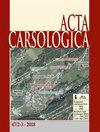A semi-automatic approach for doline mapping in Brazilian covered karst: the way forward to vulnerability assessment
IF 1.1
4区 地球科学
Q4 GEOSCIENCES, MULTIDISCIPLINARY
引用次数: 2
Abstract
Doline mapping is paramount in the vulnerability and risk assessment of the underground karst environment by identifying cave-ground connectivity points at the surface. However, manual mapping is labour-intensive, slow and subjective, especially on a large scale. Therefore, the present study adopted a GIS-based semi-automatic approach for mapping large and medium-sized depressions/dolines in the Corrente river basin in Brazil, with a particular focus on the environmentally preserved areas of river Vermelho (APANRV Portuguese abbreviation) using remote sensing (DEM and Google Earth imagery) and field-based observations. Seven typical dolines forms (e.g., cockpit with drain insertion, collapse, collapse with river capture, suffosion, solution, cover collapse, and buried) are found from extensive field surveys. As an outcome of the proposed approach, two hundred and thirty-two medium to large-sized dolines have been identified and categorised into three main groups based on the cave density and local geology G1, G2, and G3. The high density of identified dolines (164 known caves) in G1 provides reconnaissance for future speleological works in the preserved areas. Additionally, the presence of a considerable number of dolines in the adjoining areas (G2 and G3) stresses the need to revise the existing boundaries of the APANRV. Results correlate well with the dolines sites marked using field surveys and Google Earth images. This doline mapping may help researchers in the groundwater vulnerability assessment and the protection of speleological heritage preserved in the caves.巴西覆盖岩溶的半自动地形图绘制方法:脆弱性评估的前进方向
Doline绘图在地下岩溶环境的脆弱性和风险评估中至关重要,因为它可以识别地表的洞穴-地面连通点。然而,手工制图是劳动密集型的、缓慢的和主观的,尤其是在大范围内。因此,本研究采用了基于GIS的半自动方法绘制巴西科伦特河流域的大中型洼地/洼地,特别关注Vermelho河(APANRV葡萄牙语缩写)的环境保护区,使用遥感(DEM和谷歌地球图像)和实地观测。从广泛的现场调查中发现了七种典型的doline形式(例如,带排水管的驾驶舱、坍塌、带河流捕获的坍塌、水浸、溶解、覆盖层坍塌和掩埋)。作为所提出方法的结果,根据洞穴密度和当地地质G1、G2和G3,已经确定了232个中大型白云石,并将其分为三个主要组。G1中已确定的高密度洞穴(164个已知洞穴)为保护区未来的洞穴学工作提供了勘察。此外,在相邻区域(G2和G3)存在大量的doline,这就强调了修改APANRV现有边界的必要性。结果与使用实地调查和谷歌地球图像标记的dolines站点有很好的相关性。这种洞穴地形图可能有助于研究人员进行地下水脆弱性评估和保护洞穴中保存的洞穴遗迹。
本文章由计算机程序翻译,如有差异,请以英文原文为准。
求助全文
约1分钟内获得全文
求助全文
来源期刊

Acta Carsologica
地学-地球科学综合
CiteScore
1.50
自引率
14.30%
发文量
0
审稿时长
>12 weeks
期刊介绍:
Karst areas occupy 10-20 % of ice-free land. Dissolution of rock by natural waters has given rise to specific landscape and underground. Karst surface features and caves have attracted man''s curiosity since the dawn of humanity and have been a focus to scientific studies since more than half of millennia.
Acta Carsologica publishes original research papers and reviews, letters, essays and reports covering topics related to specific of karst areas. These comprise, but are not limited to karst geology, hydrology, and geomorphology, speleology, hydrogeology, biospeleology and history of karst science.
 求助内容:
求助内容: 应助结果提醒方式:
应助结果提醒方式:


